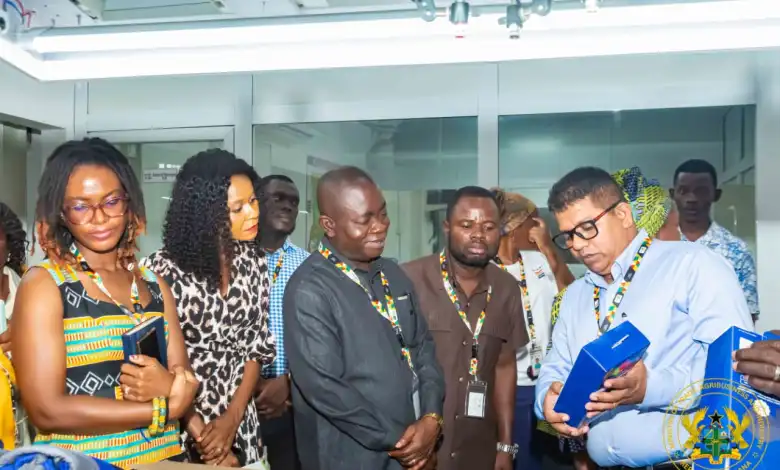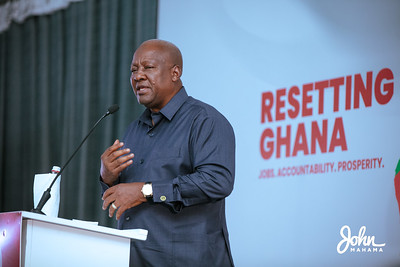The Ghanaian government has reiterated its strong commitment to reviving and growing the local textile and garment industry, with Deputy Trade Minister highlighting manufacturers’ crucial role in job creation and economic expansion.
Speaking during an official visit to factory sites in Tema and Accra, Deputy Trade Minister Hon. Sampson Ahi, praised local manufacturers, particularly Dignity DTRT Limited and Tex Styles Ghana Ltd, for employing over 6,000 youth, of whom more than 70% are women
He reaffirmed the government’s commitment to job creation and industrial growth under the 24-Hour Economy Policy, highlighting plans to establish three new garment factories, each capable of producing 3,000 jobs per shift, amounting to an estimated 27,000 jobs across multiple shifts.
The strategy also includes leveraging government procurement power, with ministries such as Education, Defence, Interior, Health, and Lands set to source uniforms and apparel from local manufacturers, ensuring stable market access for producers.
Additionally, support is being extended to Akosombo Industrial Company Ltd (ATL Fabrics) to expand operations to three full shifts, aligning with broader industrialisation goals.
Deputy Minister Sampson Ahi, assured that the government is “open to private-sector collaboration to assist them create the needed jobs and even be able to export”
The government’s push to revitalise Ghana’s textile and garment sector is receiving strong backing from key financial institutions.
Ghana Exim Bank (GEXIM), represented by Acting CEO Sylvester Mensah, reaffirmed its commitment to supporting garment industry players part of a broader effort to generate jobs and boost foreign exchange earnings, thereby easing pressure on the cedi.
In parallel, ongoing discussions with various ministries aim to mainstream local textile procurement into public sector supply chains, reinforcing Made-in-Ghana initiatives and strengthening domestic value chains.
Additionally, the Development Bank Ghana (DBG), in partnership with the Association of Ghana Industries (AGI), is investing in the sector through capacity building, access to finance, and the establishment of textile parks.
Over GHS 100 million annually has been earmarked for this effort over a three-year period, signalling a long-term commitment to industrial transformation.
Presidential advisor Goosie Tanoh emphasized the critical role of public–private collaboration in positioning Ghana as a leading textile and garment hub on the continent.
He noted that Ghana stands to benefit significantly from AfCFTA trade access and emerging nearshoring trends, which are prompting global brands to seek reliable production bases closer to African and European markets.
To realise this vision, the government has earmarked key textile and garment clusters in Kumasi, Tamale, Ho, Cape Coast, and Afienya for the development of production parks.
These hubs are expected to promote economies of scale, encourage infrastructure sharing, and drive investment across the value chain laying the groundwork for Ghana’s long-term industrial competitiveness.
The garment and textile initiative is poised to deliver wide-reaching benefits for Ghana’s economy and society.
At its core, it promises a significant employment boost, particularly for women and youth, through thousands of newly created direct jobs.
Beyond job creation, it supports economic diversification by strengthening industrialisation, boosting exports, and promoting value-addition across domestic supply chains.
Strategically, the shift toward local production and procurement also contributes to currency resilience by reducing the nation’s reliance on imports, thereby easing pressure on the cedi.
Most importantly, the programme reinforces the Made-in-Ghana vision anchoring national pride in homegrown manufacturing while unlocking new opportunities for sustainable development.
The success of Ghana’s garment and textile drive will hinge on closely monitoring the rollout of the three new factories and the extent to which government uniform contracts are channeled through local producers.
In parallel, attention will focus on the implementation of textile parks and the scale of investments facilitated by Development Bank Ghana (DBG) and the Association of Ghana Industries (AGI).
As these initiatives unfold, stakeholders will also evaluate their impact on export performance, sector competitiveness, and improvements in the ease of doing business, all of which are critical indicators of long-term viability and policy effectiveness.
Source: Myxyzonline.com





